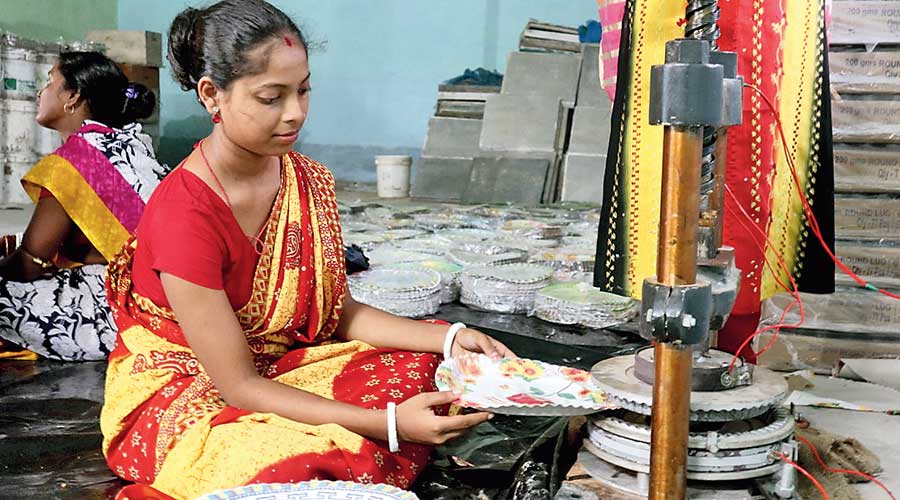A paper plate manufacturing unit in the Sunderbans started production in late August last year with two objectives, generating some income for the local women and reducing the adverse impact of plastic on the fragile ecosystem of the mangrove delta.
In the subsequent six months, the unit — near the Jharkhali market in Basanti block of South 24-Parganas, about 110km from Kolkata — has delivered on both fronts.
From making around 600 plates every day in September, the unit now makes over 4,500. The unit, which started with around 40 women workers, now employs over 65.
Among the regular buyers are around 75 tourist boats and 60-odd homestays across the Sunderbans — in Basanti, Gosaba, Kultali and Mathurapur II blocks.
The buyers have shifted from thermocol plates to cheaper biodegradable paper plates.
Rajkumar Mondal of Gosaba, who owns four boats ferrying tourists in the Sunderbans, is one of the customers. He had placed a bulk order of 30,000 plates in November and is about to finalise another order of 42,000 plates.
Plastic waste is one of the biggest threats to the Sunderbans ecosystem.
The presence of plastic increases the toxicity of the saline water, which, in turn, is feared to have a long-term impact on fishing and aquaculture, the livelihood of tens of thousands of local people.
Apart from the Bengal tiger, Gangetic dolphins and saltwater crocodile, the Indian Sunderbans, a Unesco World Heritage site, is also home to many other animals and birds. Environmentalists fear the increase in plastic waste will damage the biodiversity of the region.
The influx of plastic increases manifold in the aftermath of every devastating storm, when countless teams from Kolkata and other places reach the mangrove delta with relief material, almost all of it wrapped in plastic.
Despite an official ban on plastic by the forest department, much of the plastic waste is left behind by tourists. Plates, water pouches, bottles and cups are still in use in many homestays and boats in the mangrove delta.
“We cannot change everything. But this is a step in the right direction. The way our volume has gone up shows this is a sustainable model," said Sourav Mukherjee, founder of the Kolkata Society for Cultural Heritage, an NGO which has been supporting the manufacturing unit in Jharkhali.
The project is being funded by the South 24-Parganas Forest Division. Besides training the women, the NGO also looks after marketing and promotion.
The plant gets pulp from Rajabazar in Kolkata.
The unit started with supplying plates to local retailers and homes — gearing up for social ceremonies — in Jharkhali. It has also supplied to a handful of markets and retail chains in Kolkata. The unit found buyers in some Durga Puja committees abroad, in the Netherlands, New York and New Jersey.
Between October and December-end, Sunderbans had been brimming with tourists. The rush peaked in the run-up to the New Year before the third wave driven by the Omicron variant brought everything to a grinding halt.
"Just before the forests and parks were shut for tourists, we had been making between 4,500 and 5,000 plates every day," said Gunjan Karmakar, a member of the NGO who is involved in the operations of the unit.
With cases under control, the government greenlighted tourism in the Sunderbans from February. "The fresh orders have been encouraging and they suggest the need for a similar scale of production," said Mukherjee.
Ranjit Nayek, who owns a homestay in Jharkhali, said buying paper plates was financially viable. used to spend around Rs 1.25 paise for each thermocol plate. Paper plates cost me around 90 paise per piece," he said.
Pallabi Halder, one of the workers at the plant, lives with her husband and son in Jharkhali. Her husband, a construction labourer, was often without work during the past couple of years because of the pandemic.
For the past three months, she has been earning "around Rs 3,000," every month from the unit.
“Being able to have my own income is a special feeling. I brought a mobile two months ago, the first time I got something with my own money," she told The Telegraph, over the same phone.
